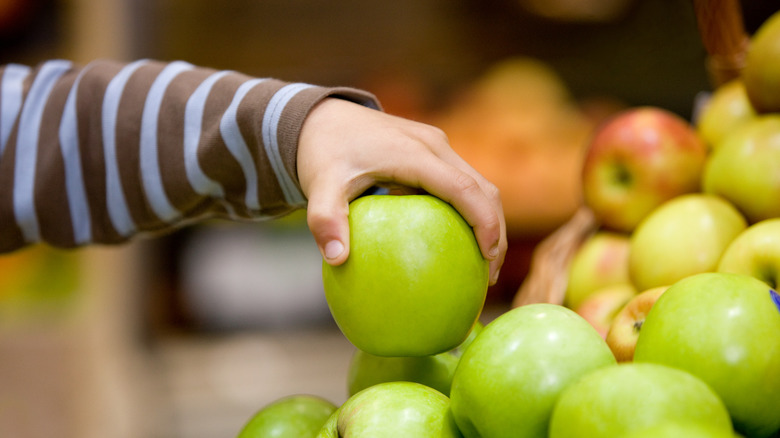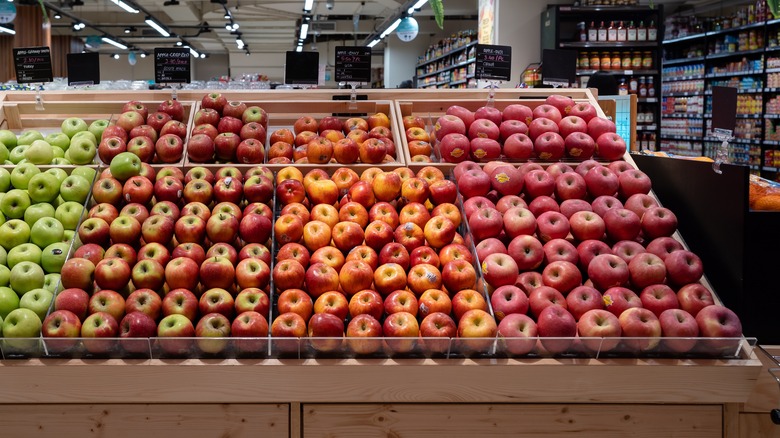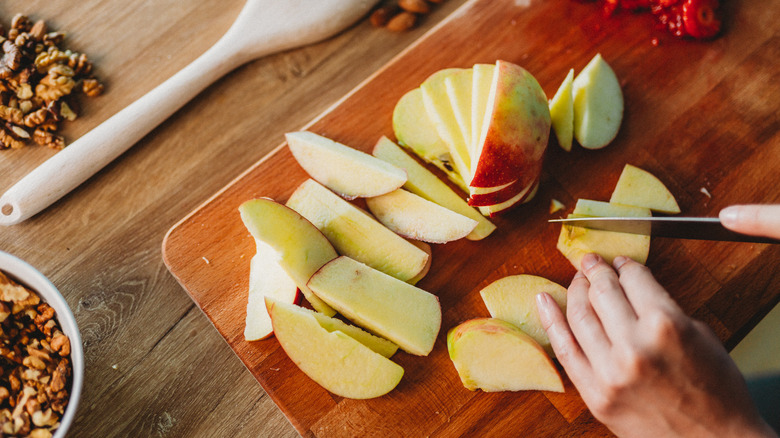Storing Whole Vs Cut Apples: Which Method Keeps Them The Freshest?
There are a lot of safety issues you need to keep in mind when it comes to fruit. Because you will probably eat your fruit raw, it won't be heated to destroy any bacteria it might pick up. Many of these safety practices concern food prep. Wash your hands before touching, cut away damaged areas, and wash your fruit. However, it is just as important to learn how to store fresh fruit such as apples so they are safe to eat.
There are general, common sense rules that apply to storing foods that you will eat raw. For example, you want to keep these foods away from all raw meat, but there is also special guidance for storing specific foods. That guidance may vary depending on the state of the food. For example, apples can be stored whole or cut. However, since cut apples do not last as long as whole apples, you cannot store them the same way. Here are the best methods for storing both whole and cut apples.
Best way to store whole apples
Whole apples are naturally designed to remain fresh. They have a protective wax coating that helps keep the apple firm, prevents moisture loss, and serves as a barrier to keep out bacteria. Even something seemingly as insignificant as a missing stem can diminish the shelf life of an apple because it gives the bacteria a place to enter. So, the first step for best storage is to pick whole, healthy apples.
If you will be eating your apples within a week, there are no major storage concerns. Wipe them down (don't wash them until you're ready to eat) and place them in a bowl away from direct sunlight. Do not store them in a paper bag because apples release gasses that can become trapped and accelerate spoilage.
If you need to store your whole apples for longer than a week, the best place for them is in a ventilated plastic bag in your refrigerator's crisper drawer, where they can last up to six weeks. While apples last longest at temperatures between 31 and 36 degrees Fahrenheit, the rest of your food would freeze at that temperature, so it is not ideal. You can freeze your whole apples, but when you thaw them, you will discover they have lost their crispness.
Best way to store cut apples
Cut apples don't have the same protective benefits as whole apples. The exposed flesh is much more prone to becoming contaminated. Consequently, you must take a little more care when storing cut apples. Also, they will not last as long. A cut apple may only last five days when stored in the refrigerator. Therefore, cut apples cannot be stored the same way as whole apples. Whereas whole apples need to breathe so the gasses they emit can escape, cut apples should be stored in an airtight container in the fridge to preserve them for as long as possible.
Unfortunately, as soon as you cut an apple, it becomes vulnerable to oxygen. When air comes into contact with the apple's flesh, it turns brown. Even sealing it in the best airtight container doesn't completely prevent this because air enters every time you open the container. If you want to keep your cut apples from turning brown, you'll need to soak them in salt water for a few minutes before rinsing and storing them. Alternatively, you can store the apple pieces in lemon juice. The only downside to this solution is it adds a slight tartness to your apples. Many people, however, find this enhances the flavor, so you could look at it as a benefit, depending on your taste preferences.


